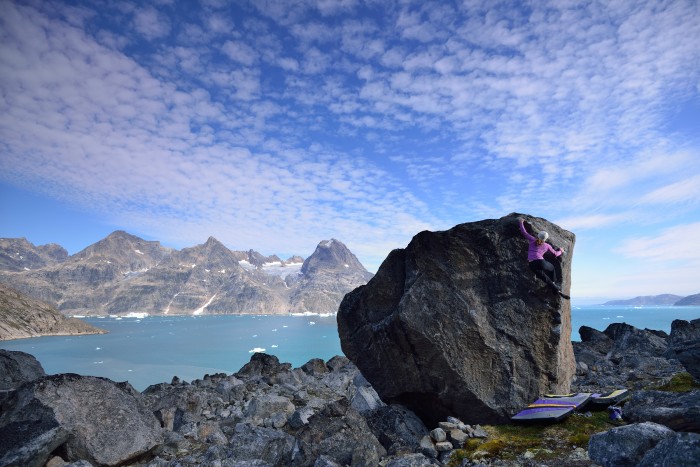Ladies we Love: Climber Angie Payne

World-class boulderer Angie Payne first started climbing at age 11 in her home state of Ohio. RockQuest, a local Cincinnati climbing gym, harbored her passion for problem solving and sport climbing competitions challenged her skills. Post high school, Payne relocated to Boulder, Colorado. Once she stepped beyond her Midwest shell she began to rock the bouldering world. In that 2003-2004 season, the Mountain Hardwear athlete won three American Bouldering Series (ABS) National Championships and two Professional Climbers Association (PCA) competitions.
Her game continued to progress—big time. In six years time, Payne became the first female to top 17 boulder problems with V10-V12 ratings. In addition to that impressive lineup, she made an ascent of The Automator in Rocky Mountain National Park—which made her the first woman in the world to climb a confirmed V13.
She also stood on the podium in more than ten climbing competitions including first place at Sendfest 2006, hosted at the Outdoor Retailer Summer Market expo, and another first place spot in the 2010 Triple Crown Bouldering Series’ Horse Pens 40 competition.
Even with the challenge of juggling a job while earning a degree at the University of Colorado, Payne carved out time for her crash pad. Often, she’d post-up solo, under the stars, and boulder by headlamp. Her persistence paid off. Here, WomensMovement catches up with Payne to see how she balances it all.
WM: What’s your favorite climbing memory?
Angie Payne: There’s a memory that I always go back to. I grew up climbing in a gym until I moved to Colorado. I was 17 and in the bouldering gym with friends that I climb with a lot—I climbed with a bunch of guys. I was throwing myself at [the problem] and it involved the forearms contacting the hold. That’s what climbing was in the Midwest for me. Nothing earth shattering, but it captures that community and camaraderie: just laughing and heckling each other, and trying really hard to the point of exhaustion.
WM: How long have you been competing—and how has it changed for you?
Angie: I’ve been competing for 18 years. I started almost immediately—within my first year of climbing. [Competing has] changed a lot. It’s grown tremendously with the number of people involved. I used to be the only kid in my category, and there were only 100 people at Nationals. Now, kids go through level after level to get to Nationals.
I think, for me, the experience has changed a lot. It’s a lot more about showmanship. A lot more attention is given to show and keeping the audience entertained. When I was younger I didn’t always enjoy competitions, and I wasn’t always doing them for myself. Now I am, and that’s changed my whole experience in competitive climbing.
WM: What’s your routine going into a competition?
Angie: I don’t have a ton of rituals. I try not to get attached to particular routines because conditions can change so much depending on the competition and the venue. My routine is to arrive on time and try to be conservative the night before with what I eat so that I don’t get sick. I try to be flexible. Maybe I should have a routine. I don’t. I go with it. And, I have fun with my friends before.
WM: How do you balance out climbing with work, relationships, and leisure in your life?
Angie: I’ve always struggled with balance. When I’ve had a job or school it’s been really hard, and outside of those two I usually have important relationships. I maintain my social life because it revolves around climbing—so I can multi-task. My boyfriend is actually a climber and climbing together is a big portion of our time. Typically I’ve done my best when I have something other than climbing. It helps me to be more focused when I am climbing. I still struggle with the balance and not getting burned out.
WM: What’s the most important lesson you’ve learned through climbing?
Angie: Most of my life has been about climbing, so most of what I’ve learned has been through climbing. It’s helped me define perspective and my perspective has changed a lot through the 18 years of climbing.
As a young kid, I thought it was all about performance and placement. Now it’s acted as a tool for me to be like ‘winning isn’t all there is.’ It’s provided perspective on what’s really important. Going to amazing places, having opportunity through traveling, meeting most of the people that are close to me, and building meaningful relationships. I’ve realized how important those relationships are and I’ve learned to appreciate that.
There are all these things that are related to it and have come from it, that are beyond just the climbing. It’s humbling. Learning about myself through it and how small I am in the big picture, and that the real importance is in the process of it all, the places I go, and the people I meet.
Kamagra oral jelly Online something to buy the most convenient way. He doesn’t demand from you any actions except how to visit the website. And in separate with goods necessary to you to put the end. To specify your address and to wait for the supplier to whom you will give money.


LET'S GET SOCIAL